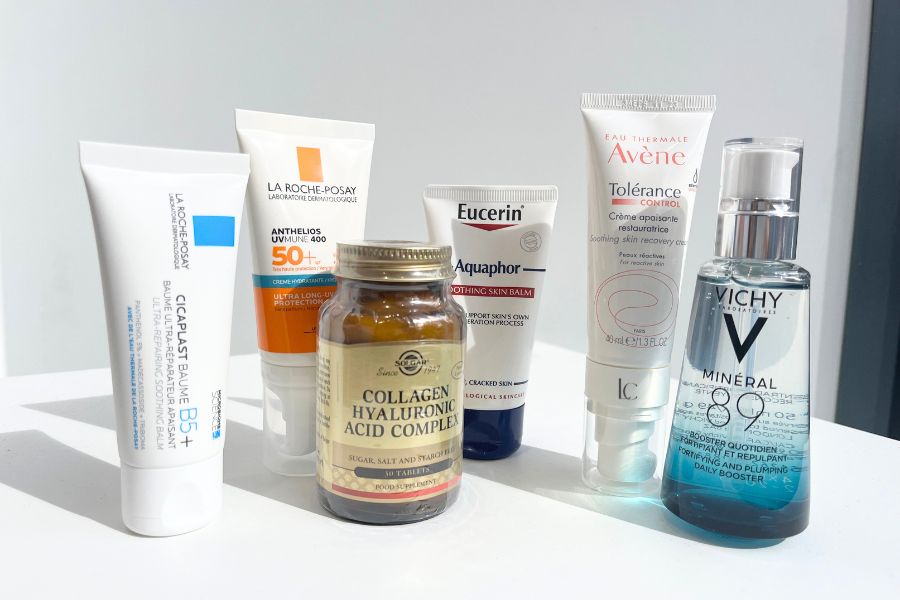
How To Treat Dehydrated Skin: 6 Simple Solutions
Managing dehydrated skin requires a different approach than just moisturising. Unlike dry skin, which is a skin type, dehydrated skin is a condition that can affect any skin type (yes your skin can still be dehydrated if you have oily skin!). Fortunately, we’re going to provide you with effective methods to easily combat the signs of skin dehydration.
In this blog we will guide you to recognising the signs of dehydration and offer effective treatments to achieve hydrated, plump, and healthy-looking skin.

What is the difference between dry and dehydrated skin?
Dry skin is a skin type characterised by a lack of oil, while dehydrated skin is a temporary condition where the skin lacks water. For a deeper understanding of these differences and how to treat each condition, check out our blog, which goes into detail about identifying and addressing both dry and dehydrated skin.
Signs of Dehydrated Skin
Spotting dehydrated skin compared to dry skin can be challenging, as the symptoms often overlap. However, dehydrated skin has distinct signs that differentiate it from simply being dry.
Here are the main signs of dehydrated skin:
- Dullness: Dehydrated skin often appears lacklustre and tired.
- Increased Sensitivity: Your skin might feel more sensitive and prone to irritation.
- Fine Lines and Wrinkles: Dehydration can cause fine lines and wrinkles to become more prominent.
- Itchiness: Unlike the rough, flaky texture of dry skin, dehydrated skin can feel itchy without visible flakes.
- Dark Circles and Shadows: Dehydration can lead to more pronounced dark circles under the eyes and sunken shadows around the face.
How to treat dehydrated skin (suitable for all skin types)
All skin types, whether dry, oily, or combination, can suffer from dehydration. Addressing dehydrated skin requires a targeted approach that works for all skin types. Here are solutions to treat dehydrated skin, no matter your skin type:
1. Hydrate from within:
Drinking enough water is the first thing you should do for dehydrated skin because it addresses the root cause of dehydration at the cellular level. Hydration levels influence our skin's elasticity, plumpness, and health. Without enough internal hydration, topical treatments are less effective.
2. Avoid hot water:
Steamy showers might feel great, but they can be a disaster for dehydrated skin. Hot water strips away natural oils, leaving your skin more vulnerable to dryness and irritation. To keep your skin happy and hydrated, switch to lukewarm water for washing your face and showering.
3. Strengthen your skin barrier:
The skin barrier acts as a protective shield that retains moisture and prevents irritants from entering. Often with dehydrated skin, the barrier is compromised, allowing moisture to escape more easily and allow irritants in, disrupting the skin's natural hydration balance. To heal your skin’s natural barrier, look for moisturisers with ingredients like Ceramides, Centella asiatica and Hyaluronic Acid. Our top recommendations are La Roche-Posay Cicaplast B5 Baume and Avene Tolerance Control Soothing Skin Recovery Cream. You can explore our skincare range for a damaged skin barrier here.
4. Avoid soaps and exfoliators:
Avoiding harsh soaps and exfoliators is important because they can strip away the skin’s natural oils and disrupt the skin barrier, making it harder for your skin to retain moisture. Instead, opt for gentle cleansers and stick to exfoliating once a week with a mild exfoliant such as the Avene Gentle Exfoliating Gel.
5. Protect your skin with sun protection:
Sun protection is a must for beating dehydrated skin! UV rays can wreck your skin barrier, causing it to lose moisture fast. Daily use of broad-spectrum sunscreen is necessary to keep your skin’s hydration intact and prevents further damage.
6. Try Supplements:
Incorporating supplements into your beauty routine can make a significant difference such as Omega-3 fatty acids, Marine Collagen, Hyaluronic Acid, and Vitamin E.
FAQ's
How long does it take to repair dehydrated skin?
Repairing dehydrated skin can take anywhere from a few days to a couple of weeks, depending on the severity and consistency of your skincare routine and preventative methods.
What type of moisturiser is best for dehydrated skin?
The best moisturiser for dehydrated skin is one that contains hydrating ingredients like hyaluronic acid and ceramides to lock in moisture and restore the skin barrier.
What is the most hydrating serum?
Our favourite hydrating serum here at Landy’s Chemist is Vichy Mineral 89, known for its concentration and low and high molecular hyaluronic acid and minerals that deeply, penetrate, hydrate, and strengthen the skin barrier.
What not to eat when you are dehydrated?
Avoid caffeine, alcohol, and excessive coffee, as these can further dehydrate your skin and body by increasing fluid loss and reducing the body's ability to retain moisture.
How often should you moisturise?
You should moisturise your skin at least twice a day, morning and night, to maintain optimal hydration levels.
Can Vaseline fix dehydrated skin?
Vaseline is often using in skin slugging for dry skin types, and can help dehydrated skin by creating a barrier that locks in moisture and protects the skin from further dehydration. However, if you have oily or combination skin this will clog your pores, so we recommend using a non-comedogenic ointment such as Eucerin Aquaphor Soothing Skin Balm. Additionally, if you have oily, combination skin, stick to using thick ointments and balms to 2-3 times a week as a treatment.




